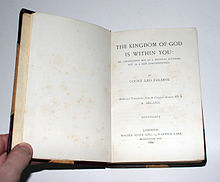The kingdom of heaven within you
The kingdom of heaven in you , “The kingdom of God is in you” or “The kingdom of God is within you” ( Russian Царство Божие внутри вас [ Zarstwo Boschije wnutri was ]) is an influential non-fiction book by Leo Tolstoy . It was first published in Germany in 1894 after it was banned in Russia . It stands at the height of Tolstoy's thirty years of Christian thought and expands a new social organization based on a literal Christian interpretation.
argumentation
The title of the book refers to Luke 17:21 ELB . Tolstoy discusses the principle of non-violence in the face of violence, as taught by Jesus . (See also Friedenskirche ). Tolstoy saw a division between the Russian Orthodox Church , which was united with the state, and what he believed to be the true message of Jesus, as reproduced in the Gospels, and in particular the Sermon on the Mount .
Tolstoy argues that all belligerent governments are an affront to Christian principles. He refers to the demand: "But I say to you: Do not resist the evil one, but if someone hits you on your right cheek, offer the other one too;" Mt 5:38 ESV . He rejects the interpretations of Roman and medieval scholars who wanted to limit the scope of the claim.
Tolstoy's correspondence with Mohandas Gandhi
Gandhi wrote in his autobiography that this book “overwhelmed” him and left a “lasting impression”. Gandhi counted Tolstoy's book with John Ruskin's Unto This Last and the poet Shrimad Rajchandra (Raychandbhai) among the three most important influences in his life.
In 1908 Tolstoy wrote a letter to the editor of an Indian newspaper ( A Letter to a Hindu ), in which he argued that the Indian people could only overthrow British colonial rule through passive resistance on the basis of charity . The following year, Gandhi wrote to Tolstoy for advice and permission to publish A Letter to a Hindu in his own Gujarati language . Tolstoy replied and continued correspondence followed until his death in 1910. The letters contain, among other things, practical and theological applications of non-violence. Tolstoy's idea was eventually realized through Gandhi's organization of nationwide nonviolent strikes and protests in 1918–1947.
Web links
Individual evidence
- ↑ Donna Tussing Orwin, The Cambridge Companion to Tolstoy
- ↑ An autobiography or: The story of my experiments with truth , Verlag Hinder + Deelmann 1977, ISBN 3-87348-162-6 Book II, Chapter 15
- ^ Mohandas K. Gandhi: The Story of My Experiments with Truth 1929. Archived from the original on August 1, 2010.
- ^ B. Srinivasa Murthy (eds.): Mahatma Gandhi and Leo Tolstoy: Letters 1987, ISBN 0-941910-03-2 .
